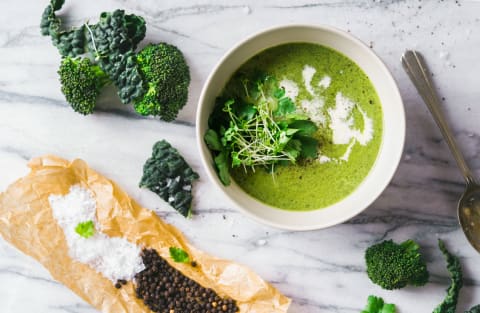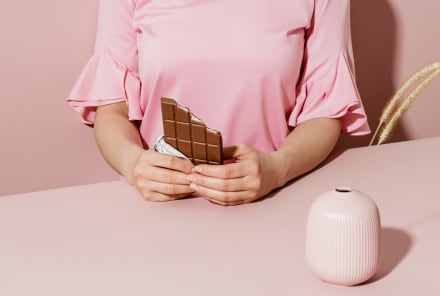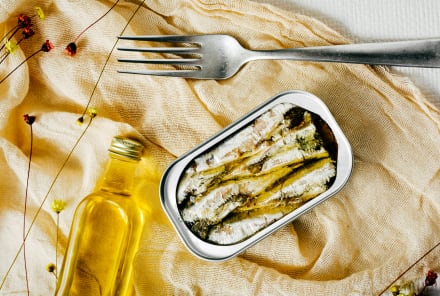Advertisement
6 Hormone-Balancing Rules To Live By


I remember walking down the street in New York City on a sunny winter day perplexed by how tired I felt, that I could not get a good night's sleep, and how I was holding on to belly fat despite an almost-perfect workout schedule.
I had gone to see my primary care doctor, who said that everything was "normal." But I didn't feel normal at all, so I started doing my own research and pinned down my symptoms: moodiness, fatigue, insomnia, PMS, bloating, brain fog, acne. I asked some of my most trusted M.D. friends, but they couldn't easily find an explanation. When I Googled these symptoms, I got menopause—but I was young and otherwise healthy and not even close to menopause. I was desperate for answers.
Many conversations, books, and scientific papers later, I realized that I was dealing with a case of hormonal imbalance, which is something that Western medicine still doesn’t have a good title or treatment for but is quite common and goes hand in hand with gut microbiome imbalance. Even my own female medical colleagues who had extensive training commiserated with me about having similar symptoms but no "proven" medical diagnosis or solution.
Sometimes listening to your own body and making proactive changes in your diet and lifestyle is the right answer. And that's exactly what I did. My healing journey was full of trial and error, but eventually I narrowed down the lifestyle changes that really made a difference for me—and the hundreds of people I've helped heal their hormonal imbalances since. In transforming my own health, I realized that this is an area where nutrition, ancient medicine, and modern medicine all meet.
1. Be wary of hormone therapy and artificial hormones.
It's so tempting to just fix a hormone problem by adding hormones to it. I tried this approach by picking up some over-the-counter progesterone cream, but I started to get side effects like acne almost immediately. Even worse, I read the studies linking hormone therapy to cancer. (A recent study even showed that low-dose hormone birth control and hormonal IUDs carry a similar risk!) Hormonal therapy has a long and proven track record of being dangerous, and I learned that food really is medicine when it comes to hormone balance.
Your take-away: Use hormonal birth control as a last resort for treating symptoms of hormonal imbalance.
2. Make sugar a very occasional treat.
Sugar is a hormone bomb. Especially those that govern our weight, hunger, and blood sugar balance like insulin, leptin, and ghrelin—all become less effective when you're chronically eating sugar. The hormones of the metabolism determine how well we'll burn fat and also have a huge influence on your energy levels and menstrual cycles. Insulin and leptin resistance not only drive you to store fat; they increase inflammation and affect your levels of estrogen and testosterone.
Your take-away: Start seeing sugar as an occasional treat. Make sure the foods you're eating like coffee drinks, yogurt, nut butters, granola bars, and nondairy milks are unsweetened or low in sugar.
3. Eat cruciferous vegetables.

Broccoli, cauliflower, and kale all bind the excess hormone in your gut and flush it out. It's a natural detox! They contain two powerful and well-studied bioactive compounds called sulforaphane and indole-3-carbinol. Indole-3-carbinol has been shown to help with estrogen dominance by binding to excess estrogen, and both help improve the gut microbiome, which results in better hormone health as well.
Your take-away: Try consuming 3 to 5 cups of these veggies every day. Even as a healthy eater, this can seem like a stretch—but it's worth it! Remember to start slow with cruciferous veggies, or you might end up bloated.
4. Get realistic about your stress levels.
You've probably heard that chronic stress can upset your hormone balance, but you might not have realized that this can also mean stressful exercise or extreme diet (like a low-carb diet or extended fasts). I am a huge believer in intermittent fasting, but you MUST realize that it puts some amount of stress on your body. Reducing bodily stress (and emotional stress, too!) through diets and exercise is often overlooked. Yoga, meditation, or just a few minutes of mindfulness during the day can help.
Your take-away: Did you know that being in nature, especially in the mornings, can do wonders for your stress hormones? Try it.
5. Consider adaptogens.
I love all adaptogens, but ashwagandha, rhodiola, and maca root are some of my faves. They can be quite strong and potent, so you should definitely work with a practitioner before trying them. If you are doing everything right when it comes to stress management, food, and exercise, adaptogens can be a really good tool for hormone balance
Your take-away: Try 300 to 600 milligrams of ashwagandha or 200 milligrams of rhodiola. Just make sure you're talking to a health care professional and getting it from a trustworthy source!
6. Prioritize gut health.
It can be a strange realization, but improving your gut can do wonders for your hormone balance. In fact, the microbiome is starting to look like another endocrine system with all the new research on its production and modulation of hormones. Did you know that the gut bacteria modulate estrogen, progesterone, and testosterone? Having healthy gut bacteria can also suppress thyroid autoimmune antibodies such as those in Hashimoto's.
Gut and microbiome health is the shortcut to healthy hormones since the gut modulates and excretes (and now we think it also makes) hormones. Society still tends to think of bacteria as "bad," but bacteria are actually good. Walking barefoot, gardening, sharing food, and avoiding harsh cleansers and preservatives are all good ways to preserve the healthy bacteria in, on, and around us.
Your take-away: Try improving your gut bacteria by avoiding all antibiotic and antibacterial products and adding some "dirt" into your life.
That's it! Of course, there are so many more little things you can do, but these six tips will create sweeping changes to your health. Remember, whenever you’re making changes to your lifestyle and diet, it will take about three cycles (three months) to see the full effects.
Ready to start healing your hormones? Check out mbg's 7-Day Gut Reset, taught by Dr. Amy Shah herself!

Dr. Amy Shah is a double board certified MD with training from Cornell, Columbia and Harvard Universities. She was named one of mindbodygreen's Top 100 Women In Wellness to Watch in 2015 and has been a guest on many national and local media shows. She helps busy people transform their health by reducing inflammation and eating more plants, utalizing the power of the microbiome to help digestion, natural hormone balance and food sensitivities. She is an expert on intermittent fasting for women and has a 2 week guided group program.
More from the author:
Functional Nutrition Training
Check out Functional Nutrition Coaching
A cutting-edge nutrition deep dive taught by 20+ top health & wellness experts
Learn moreMore from the author:
Functional Nutrition Training
Check out Functional Nutrition Coaching
A cutting-edge nutrition deep dive taught by 20+ top health & wellness experts
Learn more
Dr. Amy Shah is a double board certified MD with training from Cornell, Columbia and Harvard Universities. She was named one of mindbodygreen's Top 100 Women In Wellness to Watch in 2015 and has been a guest on many national and local media shows. She helps busy people transform their health by reducing inflammation and eating more plants, utalizing the power of the microbiome to help digestion, natural hormone balance and food sensitivities. She is an expert on intermittent fasting for women and has a 2 week guided group program.


















